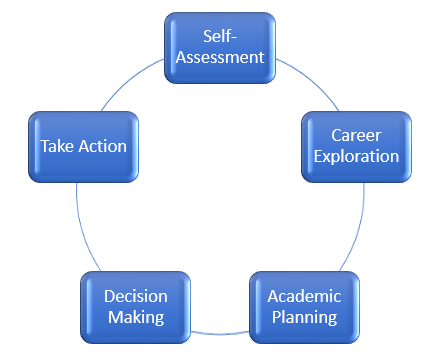Welcome to Career Planning and Exploration at Mott Community College. The Division of Counseling and Student Development is committed to providing our students with Career Planning and Exploration strategies and innovated tools to assist your individualized career goals that meet your interests, skill levels, personal values, lifestyle and economic targets.
Career Planning and Exploration can be both informal through a self-guided approach or through formal approaches that are guided by an MCC Career Counselor. We encourage our MCC students to take advantage of our counselor guided Career Planning and Exploration, however we’ve also provided a self-guided approach to Career Planning and Exploration as well.

Career assessments provide students with a way to learn more about how well a variety of careers might suit their individual preferences. There are a variety of different types of assessments which can be based on interest, skills or work values.
Typically, an assessment asks you to answer questions about what you like, don't like, what’s important to you and what your strengths are. Keep in mind that assessments are used as guides and aren’t scientifically validated.
Since assessment results may relate to hundreds of different occupations, don't panic if your results include careers that don't interest you. Experts recommended that you take more than one assessment to broaden your ideas before you decide.
After completing interest, skill and work value assessments, you can begin a more focused Career Exploration activity. Career exploration strategies include reviewing and researching career clusters and career profiles that align with your self-assessment traits and attributes. Most career exploration activities are based on understanding the typical job responsibilities within that career; knowledge, skills and abilities and personality traits commonly found in that career field; technology and software skills commonly found in that career field; minimum education requirements; as well as a job outlook including average salary, job availability and common locations that this career field is located in.
Free self-assessments and career exploration can be accessed with the links below:
Careers have a wide range of academic/degree requirements. Some careers require advanced degrees, such as a Bachelor’s, Master’s or Doctorate degrees, while some careers may only require a high school diploma, certificate of achievement and/or state or federal licensing. It is an important step in the Career Planning and Exploration phase that you research any educational requirements that are required in that career field.
Provided below is a link to occupations that the U.S Bureau of Labor Statistics determined to be the educational level and experience typically needed for individuals entering a particular occupation:
Decision Making: Once you’ve identified your academic planning research, it is time to for the decision-making process. The decision-making process is an individual and personal process, but you should make decisions that are informed and achievable. To make a quality decision, it is important that you’ve gathered all relevant information, weighed the information that is the most important to you and identified any possible alternative for your decision in the case that your initial decision must shift. Once these steps are complete, it's time to “Take Action” on your decision.
Further information on Decision Making can be found here:
Now that you’ve made a decision, it’s time to take action on those decisions. Taking action actually begins with reflections. That is, before taking action, revisit your goals and ask yourself, “why is this important to me and my goals?” Your next step is to write down these action steps to provide yourself with an action-oriented list. Please remember that as you make progress on your action, that you may need to add additional steps or revisit your alternative plans. Another practice to hold yourself accountable to taking action is to tell a family member or a friend of your plan. You may find this to be insightful and inspirational, and it may motivate you to continue your action plan.
This is not an easy process, so prepare yourself for internal push back. Oftentimes taking large steps in our lives push us outside of our comfort zones, but that is where real progress is made. Mental preparation is the way to push through these uncomfortable moments and thoughts, but the reward to you is much more impactful than the temporary uncomfortableness that comes from taking action.
A Counselor guided career planning and exploration session is an excellent opportunity for MCC students to be guided through the career planning and exploration process. Unlike the self-guided career planning and exploration, these sessions are collaborative allowing the counselor to provide career guidance based on the outcomes of our innovative virtual job shadow tool as well as other tools and resources.
Career Planning and Exploration sessions require a commitment, and appointments are available for MCC students. Career Planning and Exploration sessions are scheduled for 60 minutes in length. The first session will typically include an introduction of the career counselor, goals of the career planning and exploration session, general discussion regarding career interests or goals, and are typically concluded with access to our virtual job shadow online platform. A second session is scheduled at a later date for the students and career counselor to review the outcomes of the virtual job shadow activity with the goal of our students leaving their second session with a program of study that aligns to their career goals.
There are several ways to schedule a Career Planning and Exploration session and sessions can be held either in-person or virtually:
(810) 762-0331